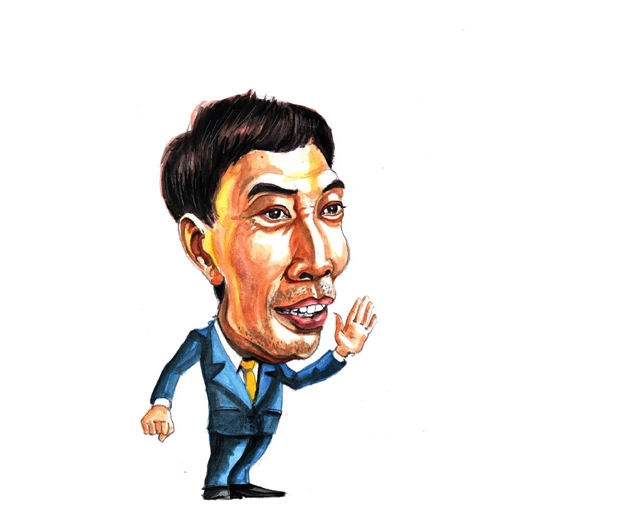The world was astonished when Facebook in June announced its future launch of its digital currency Libra, a blockchain-based token that is designed to let you make instant transfers via Facebook’s services like Messenger, WhatsApp and Instagram.

The world was astonished when Facebook in June announced its future launch of its digital currency Libra, a blockchain-based token that is designed to let you make instant transfers via Facebook’s services like Messenger, WhatsApp and Instagram.
With about 2.4 billion users, if this plan is put into practice, Facebook’s new cryptocurrency could become a game changer for the world’s banking system.
Let’s set aside the skeptical attitude as well as critics of lawmakers in many countries and talk about the boom of disruptive technology and future development of the digital transformation.
Disruptive technology and digitalisation is a new but irreversible trend. It is significantly altering the ways people live and businesses operate. Recent examples of the use of disruptive technologies include financial technology (fintech), e-commerce and ride-sharing.
Because it is new and complicated, the policy responses of most countries, including developed ones, are often late compared to the actual development of the trend, which could be seen in perplexed regulations involving fintech and ride-sharing in many countries.
Cryptocurrency has emerged as an innovative product of digitalisation. A cryptocurrency is a digital or virtual currency designed to work as an internet-based medium of exchange which uses cryptographical functions to conduct financial transactions.
Based on blockchain technology, cryptocurrencies have high security, transparency and decentralisation. As they are not controlled by any central authority, they are immune to the old ways of government interference.
The technology uses peer-to-peer consensus to record and verify transactions without the need for custodians and clearing houses, which will reduce financial intermediary costs and transaction times.
Besides their advantages, fintech and cryptocurrencies, as part of the digital economy, have posed a challenge to monetary policy as well as policy sovereignty of many countries.
Among the concerns are questions of privacy, money laundering and the financing of terrorism as the result of the anonymity characteristic of blockchain technology.
The legal status (money or financial asset) of bitcoin or other digital currencies varies around the world. Some countries have explicitly allowed their use and trade while others have banned or restricted them.
Japan is seen the world’s most progressive regulative climate for cryptocurrencies; it recognises digital currencies as legal property under the Payment Services Act and gains on cryptocurrencies are taxable at rates of 15-55 per cent.
In fact, many experts have raised suspicions as to whether bitcoin and other cryptocurrencies should be considered currency when taking into account their high volatility, low degree of transactions, quite small community and not yet a real store of value.
For Libra, Facebook has advertised it as a way to improve financial inclusion for a vast pool of people without access to bank accounts.
Starting in 2020, Facebook’s 2.4 billion users will be able to shop and send money overseas with almost zero transaction fees via its social platforms, including Messenger, WhatsApp and Instagram, it said.
Moreover, Facebook’s digital coin is anticipated to gain higher customer trust as the Libra is pegged to a basket of major sovereign currencies, including the US dollar and Euro (Libra Reserve), meaning it would fluctuate less than existing cryptocurrencies.
Facebook even established a subsidiary called Calibra to run its crypto dealings and promised to separate transaction data from social data. It and 27 other founding members in Libra Association (which could increase to 100 members) will share governance power.
However, US regulators are bristling and they have sent a clear message: they don’t trust Facebook, especially since the tech giant has a poor track record of privacy and security.
Its oversight capacity is also in question following a slew of scandals including the Cambridge Analytica scandals for which the Federal Trade Commission ordered the company to pay US$5 billion for privacy violations.
The possibility that big tech groups such as Facebook could rapidly establish a dominant position in global finance could also pose a potential threat to competition, financial stability and monetary policy sovereignty, and it may undermine the power of the US dollar.
US lawmakers are considering a ban to prevent big technology companies from functioning as financial institutions or issuing digital currencies.
In Viet Nam, the Fourth Industrial Revolution is seen an important opportunity to shore up its economy, accelerate the process of modernisation and enhance its competitiveness.
In fact, disruptive technologies such as fintech, the sharing economy and e-commerce are developing rapidly in Viet Nam. The Government began to study and issue more regulations to meet actual development requirements of businesses and encourage innovation.
However, taking into account the potential adverse impacts of disruptive policies on the economy and social welfare, this process is taking a slow and cautious view.
For cryptocurrencies, the official view of the State Bank of Viet Nam is that it has not recognised them as legal ledger tender (a legal payment instrument) and exchanges and transactions of digital currency are illegal in Viet Nam.
Nevertheless, mining and trading of bitcoin and other cryptocurrencies are still happening in Viet Nam and unclear regulations have hindered tax collection on such transactions for the State budget.
Libra and cryptocurrencies are part of disruptive technologies that are inevitable which are associated with the development of fintech and digitalisation in the banking sector.
A working group of the Bank for Investment and Development of Viet Nam (BIDV) has also studied the development of cryptocurrencies such as bitcoin and the newest Libra, providing policy implications.
From the experience of many countries, it is necessary to determine the scope of the issue to have appropriate policies. Caution is needed in terms of financial and macroeconomic stability, but it should also be treated in the context of actual development in both the world and domestic markets so as we’re not passive in policymaking.
Research on policies of the other countries is also essential as Viet Nam is integrating more deeply into the global economy.
Libra should not only be seen as a single cryptocurrency but as a disruptive technology issue. It is associated with the status and development of social networks, global financial stability and policy sovereignty of major countries.
As Facebook said, blockchain technology is inevitable and the US should “absolutely” lead the world in rule-making for cryptocurrencies.
This is also an unavoidable problem for Viet Nam. We should not just wait to see when it is born but take advantage of this chance to push research and oversight of disruptive technology to have in-time and appropriate policies.
* Vo Tri Thanh is a senior economist at the Central Institute for Economic Management (CIEM) and a member of the National Financial and Monetary Policy Advisory Council. The holder of a doctorate in economics from the Australian National University, Thanh mainly undertakes research and provides consultation on issues related to macroeconomic policies, trade liberalisation and international economic integration. Other areas of interest include institutional reforms and financial systems.





